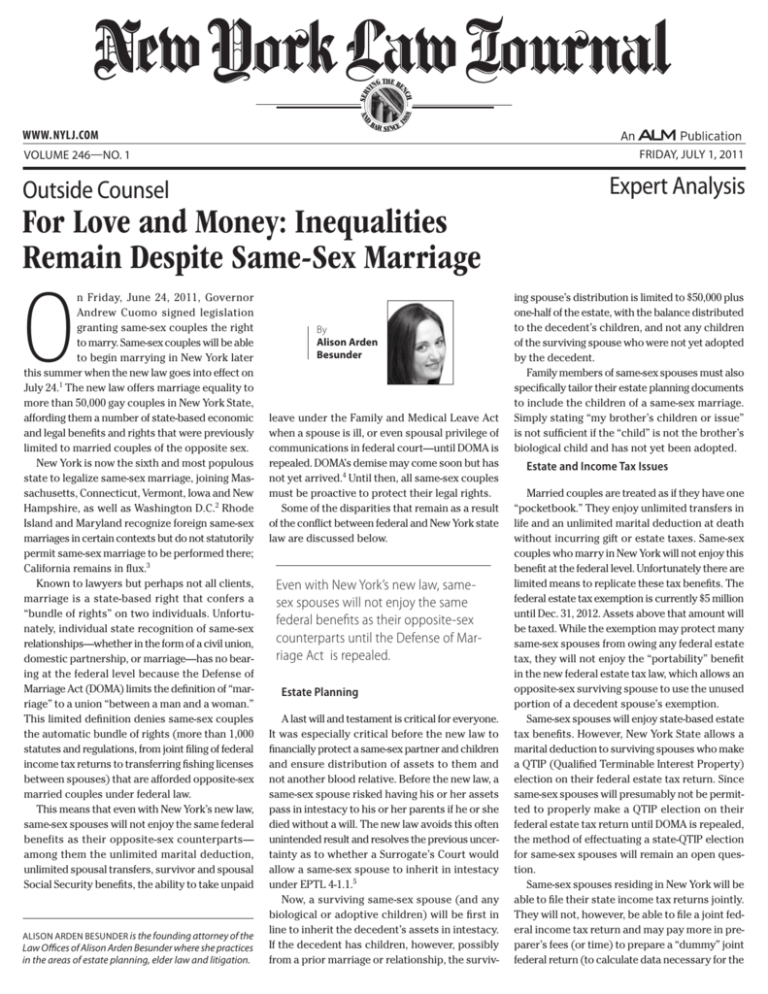
AND
88
8
SER
V
H
NC
THE BE
ING
1
BA
R SINCE
WWW. NYLJ.COM
FRIDAY, JULY 1, 2011
VOLUME 246—NO. 1
Expert Analysis
Outside Counsel
For Love and Money: Inequalities
Remain Despite Same-Sex Marriage
O
n Friday, June 24, 2011, Governor
Andrew Cuomo signed legislation
granting same-sex couples the right
to marry. Same-sex couples will be able
to begin marrying in New York later
this summer when the new law goes into effect on
July 24.1 The new law offers marriage equality to
more than 50,000 gay couples in New York State,
affording them a number of state-based economic
and legal benefits and rights that were previously
limited to married couples of the opposite sex.
New York is now the sixth and most populous
state to legalize same-sex marriage, joining Massachusetts, Connecticut, Vermont, Iowa and New
Hampshire, as well as Washington D.C.2 Rhode
Island and Maryland recognize foreign same-sex
marriages in certain contexts but do not statutorily
permit same-sex marriage to be performed there;
California remains in flux.3
Known to lawyers but perhaps not all clients,
marriage is a state-based right that confers a
“bundle of rights” on two individuals. Unfortunately, individual state recognition of same-sex
relationships—whether in the form of a civil union,
domestic partnership, or marriage—has no bearing at the federal level because the Defense of
Marriage Act (DOMA) limits the definition of “marriage” to a union “between a man and a woman.”
This limited definition denies same-sex couples
the automatic bundle of rights (more than 1,000
statutes and regulations, from joint filing of federal
income tax returns to transferring fishing licenses
between spouses) that are afforded opposite-sex
married couples under federal law.
This means that even with New York’s new law,
same-sex spouses will not enjoy the same federal
benefits as their opposite-sex counterparts—
among them the unlimited marital deduction,
unlimited spousal transfers, survivor and spousal
Social Security benefits, the ability to take unpaid
ALISON ARDEN BESUNDER is the founding attorney of the
Law Offices of Alison Arden Besunder where she practices
in the areas of estate planning, elder law and litigation.
By
Alison Arden
Besunder
leave under the Family and Medical Leave Act
when a spouse is ill, or even spousal privilege of
communications in federal court—until DOMA is
repealed. DOMA’s demise may come soon but has
not yet arrived.4 Until then, all same-sex couples
must be proactive to protect their legal rights.
Some of the disparities that remain as a result
of the conflict between federal and New York state
law are discussed below.
Even with New York’s new law, samesex spouses will not enjoy the same
federal benefits as their opposite-sex
counterparts until the Defense of Marriage Act is repealed.
Estate Planning
A last will and testament is critical for everyone.
It was especially critical before the new law to
financially protect a same-sex partner and children
and ensure distribution of assets to them and
not another blood relative. Before the new law, a
same-sex spouse risked having his or her assets
pass in intestacy to his or her parents if he or she
died without a will. The new law avoids this often
unintended result and resolves the previous uncertainty as to whether a Surrogate’s Court would
allow a same-sex spouse to inherit in intestacy
under EPTL 4-1.1.5
Now, a surviving same-sex spouse (and any
biological or adoptive children) will be first in
line to inherit the decedent’s assets in intestacy.
If the decedent has children, however, possibly
from a prior marriage or relationship, the surviv-
ing spouse’s distribution is limited to $50,000 plus
one-half of the estate, with the balance distributed
to the decedent’s children, and not any children
of the surviving spouse who were not yet adopted
by the decedent.
Family members of same-sex spouses must also
specifically tailor their estate planning documents
to include the children of a same-sex marriage.
Simply stating “my brother’s children or issue”
is not sufficient if the “child” is not the brother’s
biological child and has not yet been adopted.
Estate and Income Tax Issues
Married couples are treated as if they have one
“pocketbook.” They enjoy unlimited transfers in
life and an unlimited marital deduction at death
without incurring gift or estate taxes. Same-sex
couples who marry in New York will not enjoy this
benefit at the federal level. Unfortunately there are
limited means to replicate these tax benefits. The
federal estate tax exemption is currently $5 million
until Dec. 31, 2012. Assets above that amount will
be taxed. While the exemption may protect many
same-sex spouses from owing any federal estate
tax, they will not enjoy the “portability” benefit
in the new federal estate tax law, which allows an
opposite-sex surviving spouse to use the unused
portion of a decedent spouse’s exemption.
Same-sex spouses will enjoy state-based estate
tax benefits. However, New York State allows a
marital deduction to surviving spouses who make
a QTIP (Qualified Terminable Interest Property)
election on their federal estate tax return. Since
same-sex spouses will presumably not be permitted to properly make a QTIP election on their
federal estate tax return until DOMA is repealed,
the method of effectuating a state-QTIP election
for same-sex spouses will remain an open question.
Same-sex spouses residing in New York will be
able to file their state income tax returns jointly.
They will not, however, be able to file a joint federal income tax return and may pay more in preparer’s fees (or time) to prepare a “dummy” joint
federal return (to calculate data necessary for the
FRIDAY, JULY 1, 2011
state return), and then file separate federal tax
returns. This may actually prove to be a benefit,
however, as the couple may escape the “marital
penalty” often suffered by the aggregated income
of opposite-sex spouses. Same-sex spouses will
also continue to be burdened by the extra federal
income tax imposed on health insurance benefits
received by one spouse from the other spouse’s
employer.
The biggest consequence to same-sex spouses
is the inability to make unlimited lifetime transfers. Gifts in excess of $13,000 (for 2011) are subject to federal gift tax. Opposite-sex spouses are
entitled to unlimited transfers without incurring
gift tax or eroding the availability of the estate tax
exemption. Because of DOMA, same-sex spouses
will continue to be limited to $13,000 annual gifts
and will have to file a gift tax return for any gifts in
excess of that amount, electing either to pay the
tax or use part of their lifetime exemption of $5
million. This seemingly large amount can quickly
dissipate if, for example, one spouse adds the
other to a deed to real property, thereby making
a gift of 50 percent of the property’s value.
Real Estate
The gift tax problem is magnified in the context
of real estate. When a husband or wife transfers
part or whole ownership of real property to the
other spouse, there is no taxable consequence,
and no tax is due on the transfer. Same-sex couples face significant consequences from the same
transaction. Not only will the transfer absorb the
available exemption, and trigger a gift tax return,
but the joint property will risk being subject to
estate tax not once, but twice if the spouses fail to
keep proper records evidencing their respective
contributions: first upon the death of the first
partner, and again at the death of the second
partner if it remains in his or her estate. In order
to establish contribution, same-sex couples must
keep documentation to prove monetary contribution to the property, either in the purchase
price or continued maintenance.
Life Insurance
A common misconception is that life insurance
is entirely “tax-free.” While death benefit proceeds
are income-tax-free, they are not estate-tax-free
unless the beneficiary is a spouse. Life insurance
can be an essential component of estate plans for
same-sex couples as it is often an effective way to
provide liquidity to satisfy any estate taxes due
as a result of the absence of the marital deduction.
Unless it is structured properly, however, the
life insurance proceeds themselves may be taxed.
An effective technique to avoid this tax is to create
an Irrevocable Life Insurance Trust (ILIT) which
will own the policy and direct the distribution of
the proceeds at death, leaving the gross proceeds
available to satisfy estate taxes and provide support for the surviving partner.
Retirement Accounts
Only federally recognized “spouses” can elect
a spousal rollover of an inherited IRA. A “spousal
IRA” becomes the spouse’s own IRA and allows
the surviving spouse to delay required minimum
distributions (RMDs) until they are 70½ (although
they may do so before then). Non-spouse beneficiaries can still take an “inherited IRA” but must
start taking RMDs the year after the decedent’s
death. The beneficiary cannot wait to take distributions until they reach 70½.
Married couples are treated as if they
have one ‘pocketbook.’ They enjoy unlimited transfers in life and an unlimited
marital deduction at death without
incurring gift or estate taxes. Same-sex
couples who marry in New York will not
enjoy this benefit at the federal level.
Unfortunately there are limited means
to replicate these tax benefits.
It is also critical to maintain accurate primary
and contingent beneficiary designations on all
retirement accounts, annuities, and life insurance
policies. For same-sex spouses, it is essential
to name the spouse by his or her individual
name, and not simply by stating “my spouse”
as a beneficiary designation. If the “spouse” is not
recognized by federal law at the time of death,
the designation will lapse and be ineffective.
Absent an enforceable designation, the asset
will be paid to the estate, potentially resulting
in an unintended distribution. As IRAs comprise
an increasing amount of clients’ estates, the payment of an IRA to an estate could also heighten
the possibility of a will contest by disapproving
or disinherited blood relatives.
Children
Children born to same-sex couples must be
adopted by the non-biological parent(s) in order
to be recognized as an heir and inherit unless
that child is specifically named and identified in
the non-biological parent’s will. Adoption also
protects the non-biological parent’s visitation
and custody rights in the event of a separation
or divorce. Adoption may not always be possible
where the child is born to a prior heterosexual
marriage and the biological parent is still alive. In
such situations, the will must specifically name
the child.
Even before the passage of gay marriage, the
New York State Legislature amended DRL §110 to
permit “two adult unmarried intimate partners to
adopt a child together” and replacing the references to “husband” and “wife” with the phrase
“a married couple.” It also enacted laws to allow
the name of a petitioner for adoption who died
prior to the completion of the adoption to be
included on the new birth certificate as a parent.
Domestic Relations Law §§113-a and 115-e; Public
Health Law §4138. Yet, countless statutory references to “husband and wife” will likely require
amendment to accommodate for the change to
New York State’s definition of marriage.
Conclusion
Although New York State’s historic legislation brings parity and equality to thousands
of same-sex couples in this state, full equality
will not be achieved until DOMA is repealed.
Until federal law conforms to cultural realities,
same-sex couples will not enjoy many of the
federally based legal advantages opposite-sex
spouses enjoy. While careful planning is important for everyone, it will remain absolutely
crucial for same-sex spouses residing in New
York.
rrrrrrrrrrrrr
rrrrrrrrrrrrrrrr
1. New York State is expected to generate as much as $184
million to the state’s economy during the three years following same-sex marriage approval, derived primarily from the increase in visitors from other states who come to New York to
marry or attend weddings. W. Thompson, Jr., Office of the New
York City Comptroller, Love Counts: The Economic Benefits of
Marriage Equality for New York, June 2007.
2. Argentina, Belgium, Canada, Iceland, the Netherlands,
Norway, Portugal, South Africa, Spain and Sweden also allow
same-sex marriages to be performed in their jurisdictions.
3. Proposition 8—an initiative to “[c]hange [] the California Constitution to eliminate the right of same-sex couples to
marry in California”—narrowly passed in 2008 with 52 percent
of the vote. A California District Court held Proposition 8 to be
unconstitutional. Perry v. Schwarzenegger, C 09-2292 (VRW),
Docket Entry #708 (N.D.C.A. Aug. 4, 2010). The U.S. Court of
Appeals for the Ninth Circuit heard oral argument in December
2010 and certified to the California Supreme Court the question
of whether the proponents of the Proposition 8 initiative can
defend the law when the state officials named in the complaint
refused to do so. The District Court decision has been stayed
pending the resolution of the Ninth Circuit appeal. In the meantime, the 18,000 same-sex couples that were legally married
before the passage of Proposition 8 remain valid due to a court
ruling.
4. The Obama administration declared on Feb. 23, 2011,
that it would no longer defend DOMA. This means that the
Department of Justice will no longer defend the law, marking
a serious logistical setback for DOMA’s defense. Even if DOMA
is repealed, however, if same-sex spouses move to a state that
does not recognize same-sex marriage, they will be excluded
from state benefits as well as any federal benefits or programs
that look to state law to determine eligibility. This severely restricts the available jurisdictions to which same-sex couples
might retire or relocate for employment. Proposed federal legislation called the “Respect for Marriage Act” seeks to resolve
this issue by repealing DOMA; it would allow the federal government to provide benefits to same-sex spouses even if they
reside in a state that does not recognize the marriage.
5. Compare In re Rantfle, 81 A.D.3d 566 (1st Dept. 2011)
(holding a same-sex partner to be a decedent’s “surviving
spouse and sole distributee” under EPTL 4-1.1 and that citation of probate need not issue to anyone under SCPA §1403(1)
(1)) with In re Diba, 28 Misc.3d 1207(A) (Bronx Surr. July 8,
2010) (noting that same-sex spouses were excluded from the
benefits of EPTL 4-1.1(a)(1) and Domestic Relations Law §6).
Reprinted with permission from the July 1, 2011 edition of the NEW YORK LAW
JOURNAL © 2011 ALM Media Properties, LLC. All rights reserved. Further duplication
without permission is prohibited. For information, contact 877-257-3382 or reprints@alm.
com. # 070-09-11-15



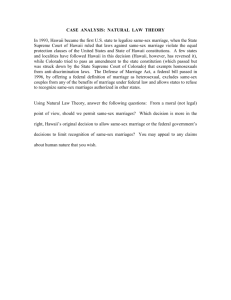
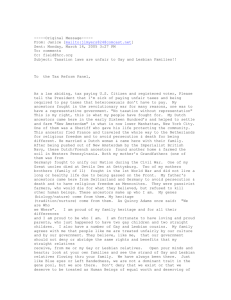
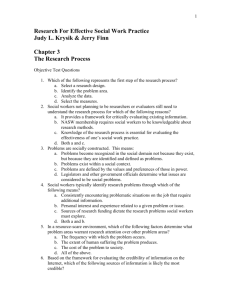

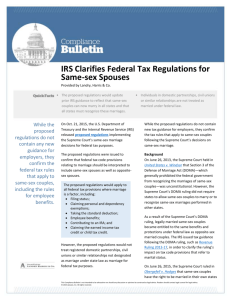
![Peter Collard [Details removed] Dear Sir and/or Madam National](http://s3.studylib.net/store/data/007613680_2-0e9d06f34ba7c7a5a822dec6a16b6bcf-300x300.png)